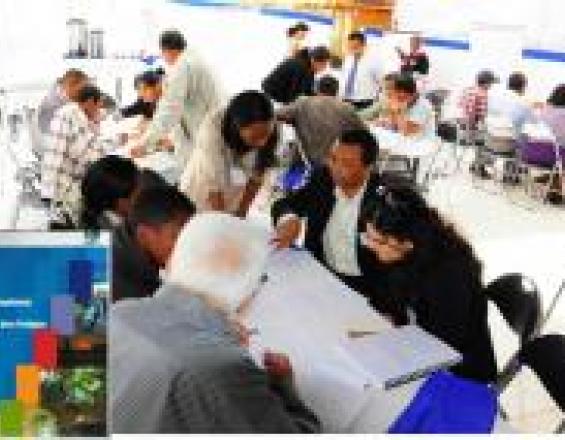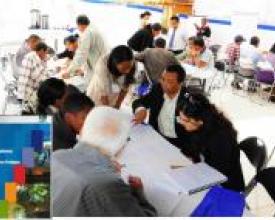A competency-based approach to professionalize PA management in Madagascar
Full Solution

Workshop with PA professionals and planners
REPC-MD
REPC-MD developed the first competence register for protected area (PA) management in Madagascar. It covers the critical knowledge areas, skill sets, and attitudes required by effective PA professionals, and profiles the roles and responsibilities associated with effective PA management. We are supporting opportunities for training and certification of PA professionals aligned with this register, to advance the professionalization of national PA management.
Last update: 23 May 2018
4523 Views
Context
Challenges addressed
Development of the Competency Register has created some reluctance and hesitation. There was the difficulty to make distinction between what "should" a PA manager be competent at and the current occupations. Moreover, creating a Standard implies discussing more complicated mechanisms of what would happen if these standards are not reached, but also if they are reached.
Location
Madagascar
East and South Africa
Process
Summary of the process
We integrated a partnership and participatory approach with a competency-based approach to catalyze strategic long-term thought and action for improving PA management in Madagascar. We recommend following 5 steps:
1: Demonstrate the importance of long-term capacity building to ensure the sustainability of protected areas via workshops to help better understand its issues and challenges (BB#3).
2: Mobilize local expertise to create key tools: Standard and Skills Certification System. The creation of an ad hoc committee composed of the Ministry staff, representatives of conservation NGOs, universities or vocational training center facilitates collaboration and reflection, and creates local ownership (BB#2)
3: The members of the ad-hoc committee are the ambassadors of the approach to their institutions, to facilitate consultations. They help disseminate the approach within their own organization first and later on, in larger scales (BB#1)
4: Go through the existing spaces for dialogue to validate the process and tools (BB#1)
5: Disseminate tools and product resources through our network of collaborators and partners (BB#1).
Building Blocks
Collaboration between conservation actors
Over the ten-year project, REPC-MD has achieved to connect over 1,300 conservation actors representing 215 conservation institutions and creating a network of conservation educators and practitioners across Madagascar. We started by inviting a few faculty members and professionals from NGOs to collaborate together to develop training materials. We maintained this network active through involving larger and more diverse actors in our local meetings, short trainings and group discussions. Our capacity development program for PA management is a joint collaboration with the Ministry in charge of PAs, universities and trainings centers, and local and international NGOs. Our collaborators from the Ministry helped us advance official recognition of the Standards. Universities and training centers offered new competency based training programs. And professionals gave us real-world experiences as inputs for the development of competence register.
Enabling factors
We offer various ways for interested people to get involved in the project: in small groups, in workshops, as trainers, as assessors. • REPC-MD started as a multi-institutional consortium and strong partnership of international NGOs and Malagasy universities, NGOs, and government institutions, which really was an asset for networking and partnership.
Lesson learned
It was important to base our project on local consultations in order to identify competences for PA management. This activity has involved a diverse group of actors from academics to professionals and even local communities. We were able to collect significant inputs to build the national standards of competences for PA management and to give people opportunities to discuss on PA in general. Since there are very few publications, we preferred group discussions during workshops to have people share their experiences. REPC-MD also has built tradition of exchanges, making it easier to reach out to different people.
Value local expertise and build on existing structures
When REPC-MD started developing the Standards, we created a small ad hoc committee made up of Malagasy experts to launch the reflections. We progressively broadened our discussions by making several presentations and meetings at different platforms to promote and refine this new approach. In Madagascar, the Ministry has a directorate in charge of PAs so we worked closely with this structure as well as a multi-sector platform on PAs called Commission SAPM (commission of the system of protected areas of Madagascar) that regularly discusses advancements of PA creation and management.
Enabling factors
REPC-MD’s long experience in partnership and collaboration between conservation actors (see building block #1) has greatly supported the identification of the institutions and structures to work with. • Our ad hoc committee was composed of people from various backgrounds (academics and professional world) but who are already knowledgeable in the conservation world. They helped us promote the concept of the competency approach.
Lesson learned
Valuing local expertise and existing structures does not close doors to other initiatives or to creativity. Our competency standards had its roots in the one developed in the Asian region, and our certification program is inspired by WIOMSA work on certification in East Africa. At some point, discussions were about creating a new structure at the ministry called Secretary for Certification that is going to implement the performance recognition system as part of the PA management effectiveness process since the existing structure is not adequate. Unfortunately, we were not able to move forward to implementing, since the decision needs to be taken at higher level (Minister’s level).
Paradigm shift from training to capacity development
During the first seven years of the project, REPC-MD has organized more than 50 trainings on conservation topics. These trainings were very popular. But we started to realize that it is very difficult for us to measure our impact. We, and most of our partners were more interested in going beyond expert based training and academic curricula, to equip PA staff with right skills and competences. The development of the Standards was the first step to move towards a competence approach. Instead of identifying topics or content to be taught to protected area managers and conservation actors, this approach looks for ways to help them better perform their job. Although we primarily worked on protected area management, we were able to duplicate the approach to a competency-based training program for conservation faculty-members. We have improved our assessment and evaluation methods to assess not only learning gains but to obtain proofs of performance as well.
Enabling factors
Competency approach requires collaboration at individual and institutional level because the aim is improvement of job performance. Close collaboration with the Ministry in charge of PAs and with major NGOs helped us to position PA manager as a job on itself with its own sets of knowledge, skills and attitudes, and to develop a system of competency recognition. • Recent global advancements in PA capacity development confirmed the adoption of a competence approach. We got ideas from IUCN WCPA work as well as initiatives in other countries of East Africa.
Lesson learned
The competency-based approach to enhance skills and identify gaps takes time for PA staff to understand, persistence is needed. We had the same guest lists for any of our event related to professionalization of PA management, in order to build a consistency of people that understand and assimilate the concepts and tools – or at least, are aware of the development of the approach. The position of the government (ministries and agencies) is really essential for real ownership and engagement by the various stakeholders. When the Ministry showed that it adhered to the vision and helped launch the initiative, other partners followed. The frequent change of staff at the Ministry level forced us to repeat some steps.
Impacts
Our work on developing competence standards for conservation professionals set an important precedent and foundation in Madagascar. The Standards serve as a tool for performance assessment, designing training curricula and career development pathways, and for recruitment in the field of PA management. The impact has been a paradigm shift based on three major principles: 1) training and competences should be clearly linked to professional efficacy and performance; 2) capacity development is a long process that continues during the professional career; 3) capacity development is needed at individual, organizational, and system levels. Our participatory approach involved the Ministry of Environment and 150 individuals from almost 30 institutions, and included designing and piloting training programs to meet the Standards. Importantly, the Ministry plans to use them for management accreditation in future. REPC-MD has catalyzed strategic long-term thought and action for PA management in Madagascar, mainstreaming the importance of capacity development, and fostered a leadership role for the country in regional conservation capacity building work.
Beneficiaries
Government actors and NGOs managing PAs in Madagascar, PA professionals and Community Based Organizations managing PAs.
Story
Please contact solution provider
